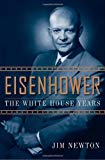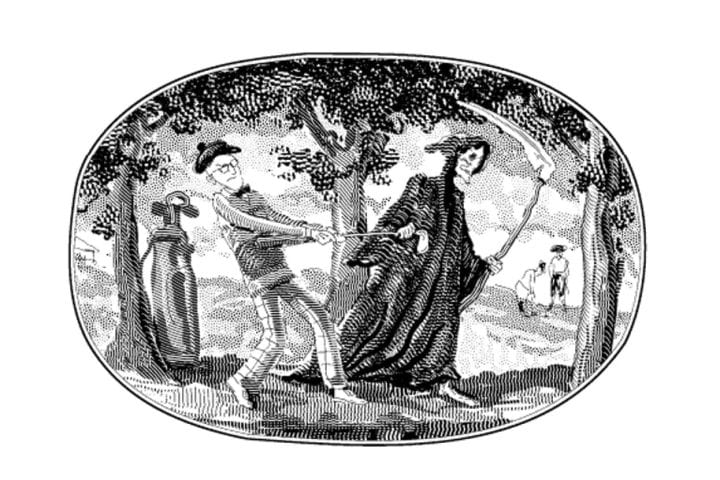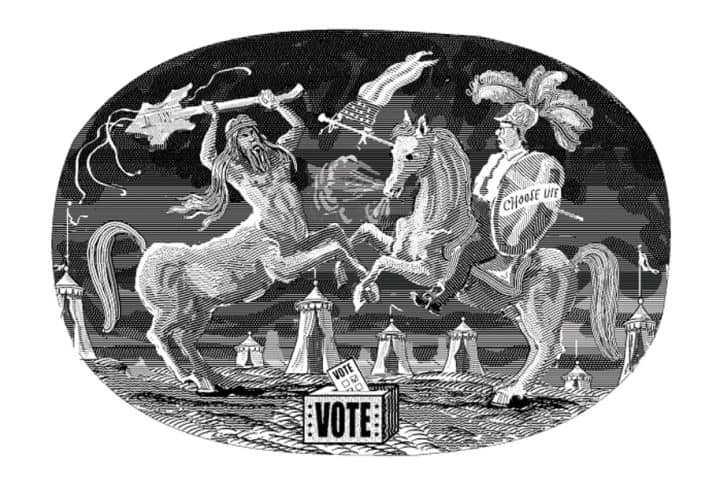Books Reviewed
A review of Eisenhower 1956: The President's Year of Crisis—Suez and the Brink of War , by David A. Nichols; Eisenhower: The White House Years
, by David A. Nichols; Eisenhower: The White House Years , by Jim Newton; and Eisenhower in War and Peace
, by Jim Newton; and Eisenhower in War and Peace , by Jean Edward Smith
, by Jean Edward Smith
In 1962 when Arthur M. Schlesinger, Sr., reported the results of a survey he had organized among 75 of his leading academic colleagues, Dwight D. Eisenhower ranked 22nd of 32 presidents of the United States (William Henry Harrison and James Garfield were excluded because of their short terms). That placed Ike at the very bottom of the average or mediocre category, trailing Benjamin Harrison and Chester A. Arthur and scoring barely ahead of Zachary Taylor. This was surprising, in one sense. In a country still strongly Democratic, the Republican Eisenhower had been elected twice in landslide victories against a formidable opponent, Illinois governor Adlai E. Stevenson. His Gallup approval rating six weeks before leaving office was 60%. The nation was prosperous and the national debt, which had been about 100% of GDP when he took office, had shrunk by 30%. For all the tensions of the Cold War, which Ike had inherited, the world was at peace. Few doubted that, but for the recently enacted 22nd Amendment, he would have won a third term had he been allowed to seek one.
But Schlesinger's survey was of scholars, not voters, and in the groves of academe Eisenhower's popularity was dismissed as an artifact of the lowbrow unsophistication of the great American unwashed. The two leading scholarly books on the presidency at the time, both published in 1960, were Richard E. Neustadt's Presidential Power: The Politics of Leadership and the second edition of Clinton Rossiter's The American Presidency. Taken together, these books expressed the egghead consensus on Ike that Schlesinger's survey had registered. Rossiter concluded that "[t]he most important factor of all" in explaining the president's failures "was Mr. Eisenhower's inability or unwillingness (they are really the same thing) to ‘work hard at being president.'" Neustadt's critique was even more sweeping. Eisenhower, he charged, was a virtual bystander in his own presidency. Limited by "the irrelevancy of an army record compiled for the most part outside Washington," Ike was "typically the last man in his office to know tangible details and the last to come to grips with acts of choice." He never "quite got over ‘shocked surprise' that orders did not carry themselves out."
* * *
To be sure, Eisenhower remained popular even after leaving office. In 1964, when William F. Buckley, Jr., was casting about for a way to elect Barry Goldwater president, he could come up with no idea more likely to succeed than placing Eisenhower on the Republican ticket as the vice presidential running mate. In January 1968, seven years after leaving office, Ike led Gallup's annual survey of America's most admired men. It was about that time that his scholarly reputation started catching up with the public's high regard.
The rebound began when respected liberal journalist Murray Kempton wrote an article for the September 1967 issue ofEsquire called "The Underestimation of Dwight D. Eisenhower." To Kempton, Ike's modesty of action and mildness of manner, so disdained by Neustadt and Rossiter, had begun after just a few years to seem the better part of valor. Overruling the advice of his leading counselors, Eisenhower had not gotten us into Vietnam on the side of France in 1954, much less deployed atomic weapons there. Nor had he changed course later in the decade when congressional Democrats panicked over what he knew to be a bogus "missile gap" with the Soviet Union. Eisenhower was, Kempton wrote, "as calm when he was demonstrating the wisdom of leaving a bad situation alone as when he was moving to meet it on those occasions when he absolutely had to."
Two years later, in his masterly book Nixon Agonistes: The Crisis of the Self-Made Man, the classicist and National Review alumnus Garry Wills affirmed Kempton's judgment. "Eisenhower had the true professional's instinct for making things look easy," Wills wrote. "He took over a nation full of internal doubt and suspicion, summarized (often melodramatically) in the phrase ‘the McCarthy Era.' So successfully did Ike quiet this divisive ferment that his critics would, by the end of his term in office, reproach him for running such a quiet ship." Wills regarded Eisenhower as more than "a political sophisticate; he was a political genius."
* * *
In the mid-1970s, Kempton's article and Wills's book prompted political scientist Fred Greenstein, who had unreflectively shared his academic colleagues' view of Ike as "a good-natured bumbler who lacked the leadership qualities to be an effective president," to delve deeply into the vast cache of recently declassified Eisenhower papers. Greenstein found "that behind Eisenhower's seeming transcendence of politics was a vast amount of indirect, carefully concealed effort to exercise influence." Greenstein's revisionist view was captured in the title of his 1982 book, The Hidden-Hand Presidency: Eisenhower as Leader. The contrast between the president's relaxed and genial public demeanor and his coldly strategic behind-the-scenes orchestration of events was deliberate, argued Greenstein. It enabled Ike to remain a reassuring, unifying chief of state in the eyes of the American people while making the tough-minded decisions required of an effective chief of government. This new interpretation was reinforced by the conclusion that historian and former associate editor of the Eisenhower Papers Stephen Ambrose came to in his two-volume biography, Eisenhower: Soldier, General of the Army, President-Elect, 1890–1952 (1970) and Eisenhower: The President (1984), which became the standard work.
What Kempton and Wills argued and Greenstein and Ambrose documented was that scholars had gotten Ike wrong in two ways: they didn't understand how active and strategically savvy he was; and they cavalierly devalued duty as an appropriate motive for presidents, and restraint as an appropriate style of presidential leadership. Most presidents' historical reputations remain fairly static—you don't see a whole lot of movement in scholars' presidential rankings from one survey to the next—but the Eisenhower reevaluation took root. A 1981 survey of American history professors found that Eisenhower had climbed from 22nd to 11th place, leaving in his wake not just Arthur and Harrison but also James K. Polk, James Madison, and John F. Kennedy. More recent scholarly surveys by C-Span in 2000 ranked Ike 9th and in 2009 8th—not great perhaps, but near-great.
The only remaining challenge for revisionists working to carve Eisenhower's newfound reputation into stone is to transform him into a liberal hero so that liberal professors can embrace him fully. This effort will be well served by three recent books, each slightly skewed by this odd purpose yet excellent in its own way.
* * *
Eisenhower 1956: The President's Year of Crisis—Suez and the Brink of War by former professor and academic dean at Southwestern College David A. Nichols shows Ike facing down fierce criticism from the likes of Stevenson and Eleanor Roosevelt after he stood up for the third world against the first. When Egyptian president Gamel Abdel Nasser seized the Suez canal from the British and French-dominated company that owned it, Eisenhower's response was to acknowledge that, however unattractive its leader, "Egypt was within its rights" to do so as a sovereign nation. Ike then advised Great Britain and France to adapt to the new arrangement—which shouldn't be hard, he urged, because as the canal's fee-collecting owner, Egypt would now have an even greater stake in keeping the oil flowing. Instead Britain and France secretly entered into a tripartite agreement in which Israel would invade Egypt, the two European nations would demand a ceasefire, and then the British and French would repossess the canal by force when Egypt—predictably, with the Israeli army on its soil—turned the ceasefire down. This is exactly what happened, timed to political perfection for the days immediately preceding the November 6 presidential election.
Eisenhower responded to the Israeli, British, and French invasions by telling them to leave Egypt and, more to the point, by refusing to replace the oil shipments that Britain and France no longer were receiving through the canal. Eleanor complained that Ike's support of Nasser "against our oldest and strongest allies…is an ironic, strange, and horrible situation." Stevenson wailed, even less plausibly, that standing against Britain and France "would aid the long held plans of Communist Russia to split the free world." Ike was having not a bit of it, Nichols shows in his rigorously documented work. When the Europeans realized that Eisenhower meant business, they withdrew their forces and grudgingly accepted the new status quo. Egypt reopened the canal and, as Ike had expected, kept it running in its own economic self-interest. "A half-century later," Nichols concludes, "it is hard to fathom the courage that Eisenhower summoned in opposing his wartime partners, especially in the face of fierce criticism from the Democrats in the midst of a presidential election campaign."
* * *
Nichols's fine-grained treatment of a single year of the Eisenhower presidency is nicely complemented by Jim Newton's wider-ranging Eisenhower: The White House Years. A veteran journalist and editor-at-large for the Los Angeles Times, Newton is especially strong on Ike's successful creation of a foreign policy that would thwart Soviet aggression without busting the federal budget or unnecessarily sacrificing American lives. What the former general realized was that maintaining the massive standing military built by his predecessor, Harry S. Truman, would have had both of these bad effects: its cost would jeopardize the prosperity that Ike regarded as the foundation of national security, and its availability would tempt the country to get involved in Communist-instigated small wars across the globe.
Ike's solution, carefully described by Newton, was to design a "New Look" foreign policy that "would save money without sacrifice to security by reducing military manpower and relying instead on the threat of nuclear weapons; and…would seek not only to contain Communism but to roll it back with the full panoply of tactical devices, from propaganda to covert action." In 1954, in a dramatic application of the New Look, Ike used the threat of nuclear weapons to stare down China from invading Taiwan, even as he was refusing to get sucked into France's war to preserve its colonial dominance in Indochina. In 1958, when Soviet leader Nikita Khrushchev told the Western powers to vacate West Berlin or else, Ike made clear that "our whole stack is in this play." If Khrushchev didn't believe him, he would "hit the Russians as hard as we could." Khrushchev believed him.
Newton's Eisenhower was most effective when his eye was on America's standing in the world. Having seen the German autobahns during the war, he persuaded Congress in 1956 to create the interstate highway system to help make America prosperous and strong and also to permit rapid troop movements around the country if we ever came under attack. (That's why it's called the National System of Interstate and Defense Highways.) Two years later, the president sent federal troops to enforce the law when a mob of angry whites kept black children from attending school in Little Rock. As he told the country in a televised address, "Our enemies are gloating over this incident and using it to misrepresent our nation."
* * *
No recent book works harder to make Eisenhower palatable to liberals than Eisenhower in War and Peace by Jean Edward Smith, a senior scholar in Columbia's history department. Ike "weaned the Republican party from its isolationist past," Smith argues, "restored the nation's sanity after the McCarthyite binge of Communist witch-hunting," and appointed the two Supreme Court justices, Earl Warren and William Brennan, who led "the advances Americans have experienced in civil liberty and social justice during the past fifty years."
Well, okay. But during the Eisenhower Administration and afterward, abandoning Fortress America and standing up to the Soviets became a hallmark more of Republican conservatism than of Democratic liberalism. Giving Joe McCarthy enough rope to hang himself when he went after the United States Army—"You don't have the brains of a five-year-old child…you are a disgrace to the uniform you wear," the senator raved at a brigadier general decorated for heroism on D-Day—was the first and best display of Eisenhower's "hidden-hand" leadership style as president. The Senate's subsequent censure of McCarthy cleared the way for more responsible conservatives to carry the anti-Communist flag. As for Warren and Brennan, Ike famously came to regret those appointments while taking justifiable pride in also having placed John Marshall Harlan II and Potter Stewart on the court.
Smith's gestures to the Left seem to have worked: the liberal American Prospect, reviewing his book, declared that "Eisenhower deserves to be every Democrat's favorite Republican White House occupant this side of Abraham Lincoln." (The Washington Post liked it, too.) But these are only gestures, and easily forgiven. Taken as a whole, Eisenhower in War and Peace is the best book ever written about President Eisenhower, about General Eisenhower—and for that matter, about Eisenhower the enterprising small-town boy, the well-liked, athletically gifted West Point cadet, and the politically and bureaucratically savvy peacetime officer in Panama, Paris, Manila, Washington, and elsewhere who became the second of the academy's storied class of 1915 to attain the rank of lieutenant colonel.
Most Ike books are either, like Newton's and Nichols's, about Eisenhower's presidency or, like Michael Korda's Ike: An American Hero (2007), centered on his leadership of the Allied forces in World War II. Smith's is about half and half—260 pages on the war and 262 pages on the White House—but more than mere balance is at work. Indeed, Smith's great insight into Eisenhower is that his military career fostered and displayed the qualities that made him so successful as president.
* * *
Much of what Ike learned about leadership as the wartime supreme commander is encapsulated in a September 1943 letter he sent to Admiral Louis Mountbatten, who had sought his advice on the eve of taking command of the Allied forces in Southeast Asia. "An Allied Commander-in-Chief…," Eisenhower wrote, "must seek and absorb advice and must learn to decentralize. On the other hand, when the time comes that he feels he must make a decision, he must make it in a clean-cut fashion and on his own responsibility and take full blame for anything that goes wrong."
This is the John 3:16 of leadership according to Ike, all that he knew and practiced compressed into a handful of words. Consider it phrase by phrase:
Absorb advice: As president Eisenhower met the cabinet frequently and the National Security Council weekly. Their job, according to Smith, was "to present options and argue with one another about the superiority of one course of action or another—just as Bradley or Montgomery might have done." Ike's "experience as supreme commander taught him to use experts without being intimidated by them."
Decentralize: Ike did not interfere with cabinet officers within their own departments, any more than he told Patton how to maneuver tanks. "Never bring me a sealed envelope," he instructed the White House chief usher on his first day in office. "That's what I have a staff for."
Clean-cut decision: "He made every task he undertook look easy," Smith writes. "Ike's military experience taught him that an outward display of casualness inspired confidence, and he took that lesson into the White House." Having decided to enforce the law in Little Rock, for example, Eisenhower sent in the 101st Airborne. "In my career," he told his attorney general, Herbert Brownell, "I have learned that if you have to use force, use overwhelming force and save lives thereby."
Take full blame: When the Soviets caught out the United States in a lie by shooting down a U-2 spy plane and then producing the pilot, Eisenhower rejected the advice to duck responsibility by firing Allen Dulles, the director of the Central Intelligence Agency. "I am not going to shift the blame to my underlings," he told his son John.
As general and as president, "Ike was a tireless taskmaster who worked with incredible subtlety to move events in the direction he wished them to go," Smith argues. He "knew the difference between right and wrong…. That is why the country always trusted him."
* * *
For Correspondence on this review, click here.







